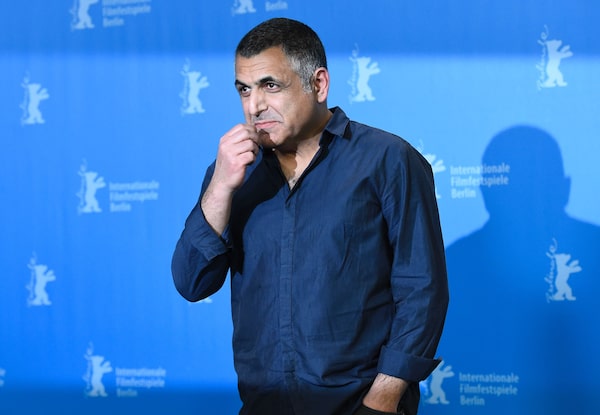
Iranian-Canadian director Mani Haghighi poses during a photocall for the film 'Ejhdeha Vared Mishavad!' (A Dragon Arrives!) in competition of the 66th Film Festival Berlinale in Berlin in 2016.TOBIAS SCHWARZ/Getty Images
As a wave of protests continued to escalate across Iran, officials seized the passport and barred the departure of filmmaker Mani Haghighi, who is also a Canadian citizen, in apparent response to the director’s widely viewed Instagram video criticizing the government’s brutal response to the protests.
In a sign that the regime’s crackdown has spread far beyond the women’s-rights protesters and dissidents who began the protests in September and is now targeting otherwise non-political figures and artists, Mr. Haghighi was stopped as he prepared to fly to the screening of his latest feature film, Subtraction, at the London film festival. He is the latest in a series of film directors to be penalized by the regime this year.
In an interview with the Globe and Mail from Tehran Friday night, Mr. Haghighi said he expected to be interrogated in coming days. He explained that he, like many Iranians, had been outraged by the Sept. 16 death of 22-year-old Mahsa Amini, who had been arrested for not wearing her hijab according to government standards and then was imprisoned, severely beaten and died of her injuries. Iranian authorities have denied that she was severely beaten. Her case has sparked protests around the world, and caused September’s anti-headscarf protests to explode into a much wider anti-government movement.
In late September Mr. Haghighi recorded an Instagram video in which he denounced the government’s crackdowns in calm Farsi. Within days it had received 20 million views on his account, and tens of millions more on others.
“I see contradiction and sophistry,” he said in the video, which then addressed Iranian lawmakers directly: “You, so proud of your pathetic masculinity, might want to listen to their protests, accept their demands, and look out for them as you’d look out for your own children, instead of letting them be assaulted with batons and bullets, and have their corpses delivered to their families who are then forced to bury them at night, in secret.”
Mr. Haghighi, who was educated in Canada and lived in Ontario in the 1990s, is a well-known director and actor in Iran. His work tends not to be explicitly political, but more subtly subversive. His latest film, Subtraction, is set in a parallel-universe Tehran in which it rains heavily all the time, and involves a married couple meeting and having increasingly disturbing interactions with their doppelgangers.
That film had a successful debut at the Toronto International Film Festival last month. He was headed to the airport gate on Thursday to attend its screening in London, Mr. Haghighi said, when he was barred from leaving.
“The immigration guy taps my passport info into the computer, and tells me I’m not allowed to leave the country, seizes my passport, and gives me a receipt. I make lots of snarky jokes about how much more trouble I’ll make if I stay in the country. Other people in line know me and know what’s going on and are anxious. A couple of women are crying. I have to take the receipt to a passport office. I expect they’ll send me somewhere to get politely interrogated.”
Officials offered no explanation for the action. In a video statement Friday, Mr. Haghighi said it was surely a response to the Instagram post. “Perhaps the authorities thought that by keeping me here they could keep a closer eye on me, threaten me and shut me up? Well, the very fact that I am talking to you in this video right now undermines that plan.”
His passport seizure follows a series of detainments and imprisonments of other filmmakers. In July, the director Jafar Panahi, perhaps Iran’s best-known living filmmaker, was sentenced to six years’ imprisonment on a decade-old charge of “propaganda against the system,” after he had inquired into the detainment of two other directors.
Iran has a history of persecuting international artistic figures with dual Canadian-Iranian citizenship. In 2003, Canadian photographer Zahra Kazemi was arrested while photographing protests in Tehran, and died after having been beaten severely in Tehran’s Evin Prison. Her death provoked a diplomatic breakdown between Canada and Iran that remains unresolved today.
 Doug Saunders
Doug Saunders